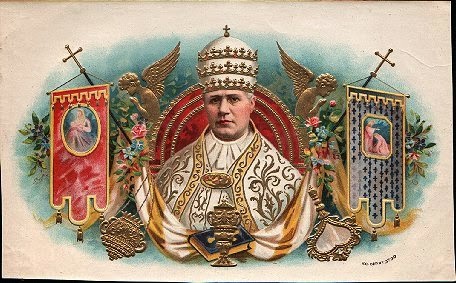 " 'Mi-ca-el,' or 'Who is like to God?'
" 'Mi-ca-el,' or 'Who is like to God?'Such was the cry of the greatest Archangel when he smote the rebel Lucifer in the conflict of the heavenly hosts, and from that hour he has been known as 'Michael,' the captain of the armies of God, the type of divine fortitude, the champion of every faithful soul in strife with the powers of evil.
Thus he appears in Holy Scripture as the guardian of the children of Israel, their comfort and protector in times of sorrow or conflict. He it is who prepares for their return from the Persian captivity, who leads the valiant Maccabees to victory, and who rescues the body of Moses from the envious grasp of the Evil One.
.jpg) And since Christ's coming the Church has ever venerated St. Michael as her special patron and protector. She invokes him by name in her confession of sin, summons him to the side of her children in the agony of death, and chooses him as their escort from the chastening flames of Purgatory to the realms of holy light.
And since Christ's coming the Church has ever venerated St. Michael as her special patron and protector. She invokes him by name in her confession of sin, summons him to the side of her children in the agony of death, and chooses him as their escort from the chastening flames of Purgatory to the realms of holy light.Lastly, when Antichrist shall have set up his kingdom on earth, it is St. Michael who will unfurl once more the standard of the Cross, sound the last trumpet, and binding together the false prophet and the beast, hurl them for all eternity into the burning pool".








































